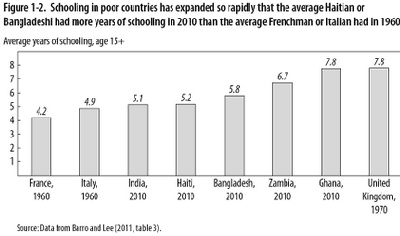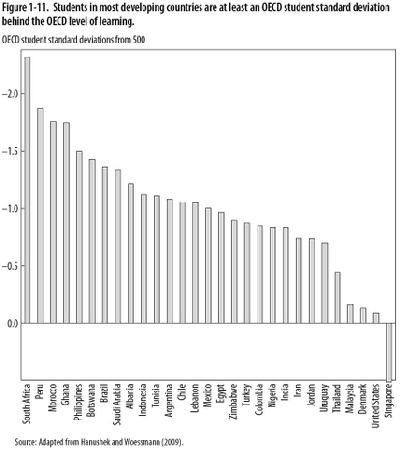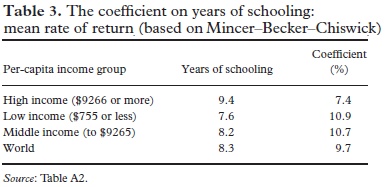
Lant Pritchett is enjoying justified praise for his new The Rebirth of Education: Schooling Ain’t Learning. His central thesis: schooling has exploded in the Third World, but literacy and numeracy remain wretched.
The average Haitian and Bangladeshi today have more schooling than the average Frenchman or Italian in 1960:
 On international literacy and numeracy tests, however, the average student in the developing world still scores far below the average student in the developed world. Gaps of one standard deviation plus are typical:
On international literacy and numeracy tests, however, the average student in the developing world still scores far below the average student in the developed world. Gaps of one standard deviation plus are typical:
 Solid work. But there’s an amazing fact that Pritchett largely ignores in this book. Despite the woeful failure of Third World schools to teach basic skills, Third World employers still greatly value educational attainment. In fact, credentials pay more in the developing world than they pay in the developed world! Psacharopoulos and Patrinos provide a thorough survey of the evidence. Quick (and conservative!) estimates say that the education premium averages 10.9% in low-income countries versus just 7.4% in high-income countries:
Solid work. But there’s an amazing fact that Pritchett largely ignores in this book. Despite the woeful failure of Third World schools to teach basic skills, Third World employers still greatly value educational attainment. In fact, credentials pay more in the developing world than they pay in the developed world! Psacharopoulos and Patrinos provide a thorough survey of the evidence. Quick (and conservative!) estimates say that the education premium averages 10.9% in low-income countries versus just 7.4% in high-income countries:

Pritchett’s omission is striking because he’s also famous for pointing out and trying to explain the fact that education is much more lucrative for individuals than nations. His leading explanations are (a) rent-seeking, and (b) signaling. My postcard version:
1. The rent-seeking story: Education successfully teaches socially wasteful job skills.
2. The signaling story: While education teaches few useful job skills, strong academic performance convinces the labor market that you’ve got the Right Stuff.
Pritchett’s latest evidence heavily tips the scales against rent-seeking. The rent-seeking story posits that Third World schools are teaching students to cleverly manipulate a corrupt, zero-sum political system. The reality, though, is that Third World schools don’t even teach students how to read, write, add, or subtract – much less file a legal brief or sue a competitor.
How does the signaling model better fit the facts? Simple. Although Third World schools fails to teach literacy and numeracy, they still rank students. Indeed, Pritchett emphasizes that one of the main problems with international test scores is that weaker students tend to drop out sooner, creating an illusion of learning in the data. What Pritchett doesn’t emphasize, though, is that employers can profit from this selection attrition by preferring more educated workers. Signaling!
Prtichett earnestly wants to bring literacy and numeracy to the world’s poor. It’s a worthy aim. But his evidence teaches us much deeper and more general lessons about the economics of education. Once you grasp how little its schools teach and how much its employers pay, the signaling story is hard to escape for the Third World. And if signaling matters enormously there, shouldn’t we expect it to matter enormously everywhere?

READER COMMENTS
Emily
Jan 25 2014 at 10:52pm
Are literacy and numeracy improving in developing countries where years of education is increasing? That’s the question I’d want an answer to in order to evaluate whether schooling in those countries is just sorting rather than teaching. This reports that literacy has gone up dramatically in Bangladesh from 1990 to 2000 and again to 2010, but that it’s actually gone down in Haiti from 2000 to 2010 (1990 data missing.) I don’t know what the larger pattern is, but that seems like the more relevant set of measures than how they’re doing compared to more developed countries.
In fact, I don’t think that the average student in these countries scores significantly behind the average student in developing countries can tell us much at all about whether what’s happening is signaling vs. human capital. Looking at this data should make you wonder why employers are willing to pay so much more for educated employees. Presumably the answer is because the less-educated ones are even less literate, and that’s consistent with either the explanation that schools are teaching stuff (just not as much as we’d like them to) or that they’re just sorting (but that with area literacy levels, the students who come out highly in the sort are still not very literate). And if that’s not the case – if those with more education aren’t actually more literate than those with less – that would confuse both explanations.
emerich
Jan 26 2014 at 6:29am
Yes indeed. The point you make is inescapable.
Glen Smith
Jan 26 2014 at 10:52am
His data seems like comparing current positions in a race where one contestant got a head start. I’d expect that the undeveloped world would be very far behind given the data given here unless I was expecting them to be more intelligent than their developed world compares.
Maybe I don’t understand what you mean by socially wasteful but rent-seeking opportunities accruing from successful education/training systems would indicate high social value to me.
Lant Pritchett
Jan 27 2014 at 1:52pm
This is an excellent critique, one that I left out a clear discussion of and perhaps should not have.
In part because the “accountability” story (e.g. World Development Report) of getting parents engaged in the education process to offset political and other pressures for just more money is made difficult if parents believe that schooling is just signaling. If they do, then we can expect parental engagement to just worry about signaling (e.g. sorting by signals if there is school choice of any kind) and not really worry so much about actual learning.
Which, I realize, makes Bryan’s critique even stronger.
That said, since a lot of what I talk about is basic (e.g. pre-secondary) education I think there is less role for signaling and where, even if there is strong signaling, conditional on that kids are there we can get them to know much more than currently happens.
Guest2
Jan 27 2014 at 5:45pm
Perhaps it is time to move beyond signaling theory entirely. Randall Collins makes an impassioned argument that, at least in the maturing developed countries in the West, education has devolved into “hidden Keynesianism”.
http://www.salon.com/2013/11/24/millennials_rise_up_college_is_a_scam_you_have_nothing_to_lose_but_student_debt/
Randall Collins, from his chapter “The End of Middle-Class Work: No More Escapes” pages 51-60.
(Note: Collins identifies and considers five (5) “escapes” in the past that have cushioned or mitigated earlier threats to capitalism. The system of education is the last of these to be discussed.)
frodo
Jan 28 2014 at 8:08pm
[Comment removed for supplying false email address. Email the webmaster@econlib.org to request restoring this comment. A valid email address is required to post comments on EconLog and EconTalk.–Econlib Ed.]
AMcA
Jan 28 2014 at 8:48pm
Re: rent seeking.
Rent seeking in most of the world is not a question of being able to manipulate the courts. It consists of knowing people. It consists of barely literate people in positions of power working things out with other barely literate people finding positions of mutual advantage.
Not all the rules and regulations of the First World. Not all the high level cognitive requirements. Just good old knowing someone.
Toads
Jan 28 2014 at 9:04pm
[Comment removed pending confirmation of email address. Email the webmaster@econlib.org to request restoring this comment. A valid email address is required to post comments on EconLog and EconTalk.–Econlib Ed.]
John Cunningham
Feb 2 2014 at 6:49pm
Education everywhere seems to have an air of cargo cult about it. Certainly in the US, bigger and fancier buildings, computer complexes, flashy video systems, all seem to pursue the trappings of education, rather than the substance. Jerry Pournelle often makes the point that his mother taught in a one-room school in Florida, but every kid left the first grade able to read through phonics. see also http://minx.cc/?post=346625
Comments are closed.